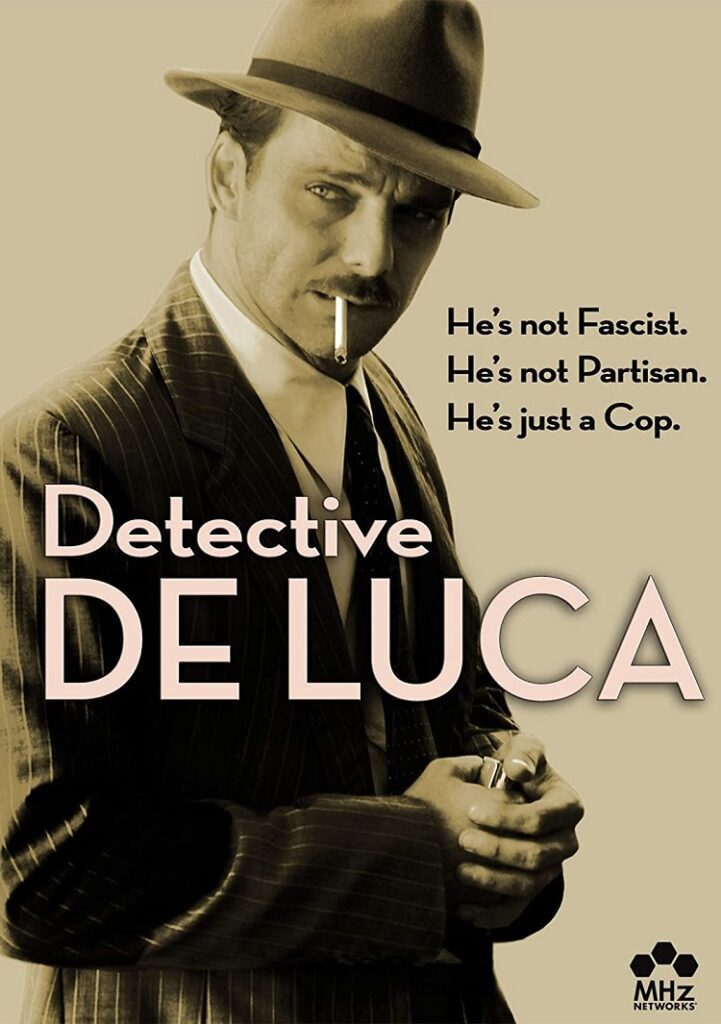
Set amidst the back-drop of Mussolini’s Fascist Italy, Detective De Luca comes with a much more interesting setting than your typical television crime procedural. Amidst a gluttony of crime and detective shows, De Luca manages to keep my attention through well-written characters and stories that surpass time and date while remaining current and real.
De Luca, the character, is a policeman first and everything else falls a distant second. He is constantly butting heads against his bosses and whatever governmental figure is in power because he cares little for politics, but only wants to solve his case. His only friend is a fellow officer whom he trusts, but is often at odds with and never fully develops a real relationship with. He is a ladies man and every episode finds him bedding one woman or another, but mostly they are creatures to pass a passionate night with. The one woman he has any feelings for at all is almost never shown any true compassion and usually finds herself tangled up into passionate arguments with De Luca.
De Luca is actually four television movies lasting just under two hours a piece (the last one clocks in at a little less, about an hour and a half.) They take place during the years of 1938 to 1948 – from the height of Mussolini’s reign to the beginning of the post-war years with an Italy trying to rebuild itself.
The character owes a lot to another hard-boiled detective, Raymond Chandler’s Phillip Marlowe. Both retain a one-track mind bent only towards solving the case. Both have an acidic wit, few friends, and are often in trouble with authority. Marlowe is a little more idealistic sometimes taking on cases for ethical or sentimental reasons while De Luca is all about the law and upholding it at any cost.
My favorite episode is the first one, An Unauthorized Investigation. It finds De Luca solving the murder of a call girl found on the beach just in front of Mussolini’s vacation home. The police department rush to solve it. They come up with a solution quick and consider the case close, but De Luca feels that something isn’t right and continues to follow leads that take him places the higher-ups wish he’d leave unexplored. The episode is a great introduction to the characters and does a great job showing the fear and trembling of not only the general populace but the rank and file of the government under Mussolini’s totalitarian reign.
The second episode, Carte Blanche, takes place in 1945. Mussolini is still in power, but the Nazis have overcome the country and the Allies are quickly pushing in. Here, De Luca must solve the stabbing murder of a wealthy bachelor. Once again he butts heads with authority, which this time includes both Fascists and Germans. Fear is everywhere, even more so when the British and American soldiers break into the city, leading the Fascists, including, at least in name, De Luca to go running to the hills.
In Cloudy Sumer, taking place just after the events of Carte Blanche, De Luca is running through the mountains under an assumed name trying to find safety. Instead, he encounters a villager who is acting as the police trying to solve the murder of a local man. There’s a bit of In the Heat of the Night feel to the episode as the local realizes De Luca worked for the Fascists (and thus hates him) but also recognizes his need for a real detective in order to solve the crime. De Luca must work efficiently but quietly less he be killed by the local Partisans as a Fascist. Interestingly, he never apologizes or tries to explain why he worked under Mussolini’s regime, which would presumably buy him some slack with the Partisans; he simply works diligently to find the murderer. Towards the end, he does ask the villager to stop calling him a “Fascist” though he never claims loyalty with the Partisans nor anyone else.
For the last episode, Via del Oche the time frame moves to 1948. The war is over and Italy is preparing for its first elections since Mussolini. The two main parties are the Communists and the Christian Democrats. The fear and tyranny are past but there is still a great deal of nervousness over which way the country will move. Once again, De Luca finds himself at odds with the current leaders as his murder investigation leads him to believe it may have been caused by one of the bigwigs in the city.
Every episode does a great job of creating a believable setting within its specific time period and place. The sets, the costumes, the details of how Italy feels seem exactly perfect. The series really gets inside both the history of war torn Italy, and the drama of these characters. De Luca is a fascinating portrait of a man who wants to do his job, and nothing but his job, despite all of the insanity all about him. We learn to care about him and the various side characters he meets along the way.
If you are a fan of crime dramas, detective shows, or just really good television, I highly recommend Detective De Luca.